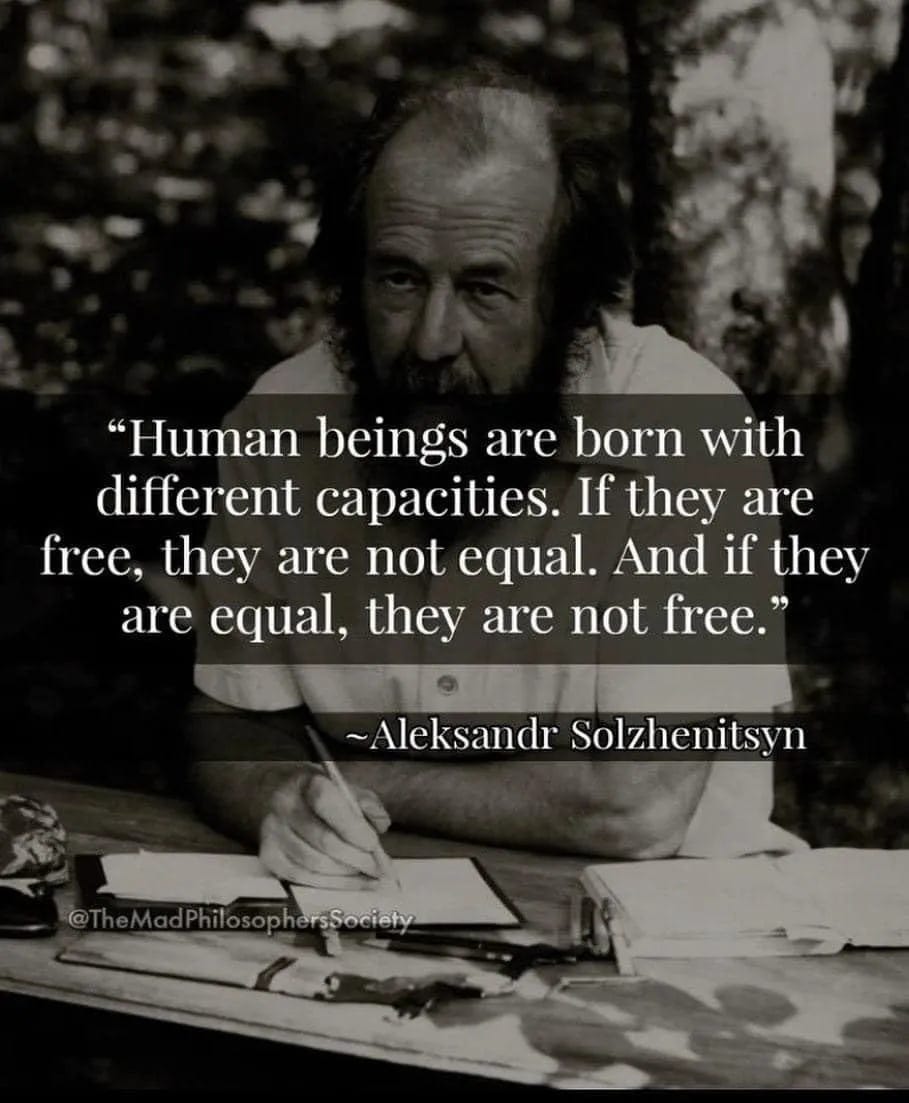As my companion in a Notes dialogue kindly noted, it is refreshing to find substance underlying an exchange of views. The initial chat arose from the quote below.
I observed, “that the devil is in the details. It should not be any kind of gray matter challenge to know that efforts to support all in achieving their capacity is a leveller that, in fact, benefits all the problem is when we lose sight of that outcome and focus on the process such that, easy to measure indicators reduce everything to meaningless data as the basis of policy and regulation. We have some real challenges ahead and an opportunity to face them. Perhaps for the first time in history given our technical capacity - will we? I doubt it.”
Not having permission, I don’t feel I should post the entire thread here. But I can say that perspectives on diversity, notably matters of race, are being explored. I am not close enough to a specific example, relative performance of schools running contrary to the realities of funding, but do hold that context is all.
My view is that efforts to create a society in which all have opportunity to reach their capacity is a “good thing.” This does not preclude each of us from accepting responsibility to develop our own capacities.
Easy-to-count indicators have poor effect. Details, and context, matter. To some, acknowledging that is anathema, anti-equality. To me, recognizing context is key. In the past (and presently) decision makers of all sorts rely on abstractions.
It seems that if our tech development is to have positive effect, that should permit us to both understand at the abstract level while enabling us to see clearly and adjust at a granular level such that individuals are not favoured or denied due to their abstract cohort but are empowered to steer their own course informed by their granular context. This may sound a bit abstract in itself, but it is not.
My correspondent in Notes responded with a well articulated concern that diversity as a concept is a reduction to the lowest common denominator. That prompts me, at 4:00 a.m., to observe:
“Up far too early for coherence, but then it is a time without competing demands, so a few thoughts for what they may be worth. I appreciate the dialogue.”
I was sent off to boarding school at the ripe old age of 12, experiencing a dramatic change in life circumstances through a car accident en route as well as a break from family and from a childhood lived in one country and wrapping up in another. That’s all relevant to my world view, but I may not connect the dots in this note.
Most directly relevant is that shift from one macro cultural to another. In one, unity was expressed as a “melting pot” that supposedly welcomed all while (to me) metaphorically distilling everyone to a pretence of sameness. That this sameness was a mirage was obvious to my young eyes, living as I had in different places in the States from Arkansas to Maine, Connecticut to New Jersey. (Kentucky came much later, as did travels to California and a time in Hawaii.)
In my new home in Canada, I was keen to observe how unity was manifested. The rhetoric was not the reductive “melting pot” but the aspirational “mosaic.” It felt glorious to me. I saw the potential of multiple cultures collaborating to create a rich and fertile ground for Canada emerging into its next centennial. Talk about aspirational.
Conceptual models are one thing, life is another. In both models, there is a failure to recognize an important truth. People bring personal and collective histories that may be in conflict with each other and with the broader cultural context in which they find, and increasingly, place themselves.
We are all both a part of and separate from our milieu. We might like to think people buy into the overarching myths that define our countries, but more than likely immigrants and inhabitants alike are more focused on survival and leveraging opportunities than on whether they objectively fit the almost spiritual claims of the “good people in charge.” More than likely, when able to lift heads from the challenges of life, they see the much touted beneficence as mere artifice, the scaffolding of a power imbalance. That imbalance grounds efforts to evolve to a greater equity, and in the “how-to” lies the challenge.
Exploring that challenge is the stuff of a longer piece. For now, I’ll post this to my Random Thoughts section and perhaps there may be opportunity to delve deeper.
At the moment, I’m moved to observe that failed efforts to achieve laudable goals often derive from shying away from a daunting complexity to focus on rules and procedure, thus adding complication. The failure to achieve the goal of a fair and just society in which all can realize their potential free of prejudicial barrriers is observed through many lenses. While some see the problem as one of an inherently unequal capacity among disperate peoples, others see complicated regulatory controls as flawed in their conception and execution such that they become the problem.
In my view, there’s substance in both views.




